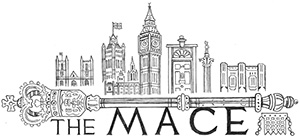We felt it would be a missed opportunity not to discuss Brexit. I won’t say whether the MP in question was Labour or Conservative, Brexit or Remain. But they concluded their position on the prorogation saga with the words: “I know I’m right.”
I know I’m right: the mantra of people in the wrong throughout the ages. Or perhaps one had better say, the mantra of people with incomplete information. The times are out-of-joint, and journalism is affected by it.
In creating this magazine, it would be pointless to deny that we seek a better conversation. I’m sometimes asked about the significance of the magazine’s name. The mace is, of course, a symbol of political authority. We aspire, as a new magazine should, to authoritative journalism. But in the Commons, the mace also acts as a guarantee of order, whereby debate can begin.
Our magazine is a kind of debating chamber: Damian Collins tells us about the mood of the new parliament; Green co-leader Siân Berry explains what she would do as PM; and David Lammy celebrates life in his Tottenham constituency. Elsewhere, William Boyd considers the novel in a post-Brexit age; Andrew Roberts and Rowan Williams discuss aspects of history and philosophy respectively; and Sting, in our wide-ranging interview, describes the obligations that celebrity imposes on the politically mindful. Mace is without bias. In these pages, William Cash interviews Steve Bannon in Washington DC, but elsewhere we meet Bannon’s UK antithesis, Gina Miller, here in London.
So ours is a cross-party debating chamber. The conversation across Mace includes not only our elected officials, but our top civil servants, public policy heads, CEOs, lobbyists and NGOs. That makes it a new dialogue – and it’s fitting that this begins now, after the alarms and excursions of Brexit, in a new parliament.
It also begins at a crucial time for the left, as both Labour and the Liberal Democrats rebuild. It is the great unknown of our politics at the moment – what kind of left will, in Yeats’s words, “slouch towards Bethlehem to be born”?
But no serious magazine can afford to lack frivolity. You are not about to enter a particularly earnest space, but one that includes cartoons and gossip. We’ll tell you about the hotels where the political class stay and the restaurants they eat in – but we’ll also tell you what’s going on at the trade department. In that sense, it is a bit like the House of Commons.
To say that politics matters like never before is to forget all the unknown lives in history whose individual interests were served insufficiently by power. It’s probably truer to say we’re beginning now to accept how much politics matters, and that we’re in our infancy when it comes to understanding how it works.
So what happens when we shed light on something which has hitherto been hidden? One’s mind bursts with cliché: the torches shone into dark spaces, and perfidy exposed. But examination as often brings to attention unexpected good – the noble work of an APPG or the policy changes quietly advanced by unsung civil servants.
Even so, for an old democracy, the UK system can seem opaque. We hope to reduce that opacity, and to have fun while doing so. Is that an important development? I think it is – and I know I’m right.


